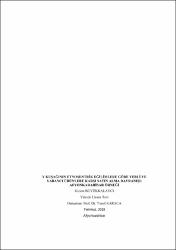| dc.contributor.author | BÜYÜKKALAYCI Gizem | |
| dc.date.accessioned | 2018-12-04T13:23:25Z | |
| dc.date.available | 2018-12-04T13:23:25Z | |
| dc.date.issued | 2018 | |
| dc.date.submitted | 2018 | |
| dc.identifier.uri | http://hdl.handle.net/11630/4994 | |
| dc.description.abstract | Küreselleşmenin hızla yayılması ve uluslararası pazarın gelişmesi ile birlikte dünyanın bir ucunda üretilen ürün, dünyanın diğer ucundaki tüketiciye kolayca ulaştırılabilmektedir. Ülkeler arası ürün giriş ve çıkışının kolaylaştığı bu zamanda firmalar girecekleri pazarda bazı problemler ile karşılaşabilmektedir. Bu problemlerden bir tanesi de tüketici etnosentrizmidir. Tüketici Etnosentrizm kavramı yabancı ürün kullanımının ahlaki açıdan uygun olup olmadığını tartışmakta olup yabancı ürün yerine yerli ürün tercih etme eğilimi olarak ifade edilebilir. Yabancı firmaların girecekleri pazarda etnosentrik eğilimlerinin yüksek olması o firmanın ürünlerine karşı ön yargı ile yaklaşılmasına sebep olmaktadır. Başka ülkelerin pazarına girmek isteyen yabancı firmaların, o pazardaki tüketicilerin etnosentrik eğilim düzeylerini bilmeleri ve ona uygun pazarlama stratejileri geliştirmeleri kendilerine rekabet avantajı sağlayacaktır.
Çalışmada Y kuşağı üyelerinin demografik özellikleri ile etnosentrik eğilimleri arasındaki ilişki incelenmektedir. Bu kuşak üyelerinin yerli ve yabancı ürünlere karşı etnosentrik eğilim düzeyleri belirlenip market, mağaza ve pahalı -lüks olarak kategorize edilmiş ürünlere karşı tutum ve davranışları incelenerek etnosetntrizm ile ilişkisine bakılmaktadır. Araştırmada elde edilen veriler “kolayda örneklem yolu” ile Afyonkarahisar ilinde yaşayan 500 Y kuşağı üyelerinden, anket yöntemi ile toplanmıştır. Toplanan verilerde istatistiksel analizlerin yapılma aracı olan SPSS programı kullanılıp analiz edilirken frekans, ortalama, yüzde alma gibi yöntemler kullanılmıştır. Normal dağılım gösteren üç ve üzeri grupların analizi için One-Way Anova Testi, niteliksel verilerin analizinde ise Pearson Ki-Kare Testi kullanılarak veriler analiz edilmiş ve yorumlanmıştır. Yapılan analizlere göre Y kuşağı üyelerinin orta düzeyde etnosentrik eğilimlere sahip oldukları saptanmıştır. | en_US |
| dc.description.abstract | With the rapid spread of globalization and the development of the international market, a product at one end of the world can easily be delivered to a consumer at the other end of the world. At this time, as the entry and exit of products between countries is quite facilitated, firms may encounter some problems in new markets. One of these problems is consumer ethnocentrism. The concept of consumer ethnocentrism discusses whether the use of foreign products is morally appropriate and can be expressed as the tendency to prefer domestic products instead of foreign products. The high ethnocentric tendency in the markets to which foreign firms are to penetrate leads to the prejudice against the products of those firms. Foreign companies aiming to enter the market of other countries will gain competitive advantage by learning the ethnocentric tendency levels of the consumers in that market and developing appropriate marketing strategies.
In the study, the relationship between demographic characteristics and ethnocentric tendencies of Y generation members is examined. The levels of ethnocentric tendency of these generation members against domestic and foreign products have been determined. Attitudes and behaviours towards products categorized as shop-store and expensive-luxury have been examined and the relationship between them and ethnocentrism has been examined. The data obtained in the survey were collected by means of the questionnaire from members of 500 Y generation living in Afyonkarahisar province through "convenience sampling method". The methods such as frequency, mean, percentage were used when analyzing SPSS program which is the means of making statistical analyzes in collected data. One-Way ANOVA test was used for the analysis of three or more groups with normal distribution, and Pearson Chi-Square test was used for the analysis of qualitative data. As a result, it is found that Y generation members have moderate ethnocentric tendencies. | en_US |
| dc.language.iso | tur | en_US |
| dc.publisher | Afyon Kocatepe Üniversitesi Sosyal Bilimler Enstitüsü | en_US |
| dc.rights | info:eu-repo/semantics/openAccess | en_US |
| dc.subject | Etnosentrizm | en_US |
| dc.subject | tüketici etnosentrizmi | en_US |
| dc.subject | Y kuşağı | en_US |
| dc.subject | yerli ürün, | en_US |
| dc.subject | yabancı ürün. | en_US |
| dc.title | Y Kuşağının Etnosentrik Eğilimlere Göre Yerli Ve Yabancı Ürünlere Karşı Satın Alma Davranışı: Afyonkarahisar Örneği | en_US |
| dc.title.alternative | Purchasıng Behavıor Of Y Generatıon Towards Domestıc And Foreıgn Products Based On Etnocentrıc Tendencıes: Afyonkarahisar Sample | en_US |
| dc.type | masterThesis | en_US |
| dc.department | Afyon Kocatepe Üniversitesi, Sosyal Bilimler Esntitüsü | en_US |
| dc.relation.publicationcategory | Tez | en_US |



















